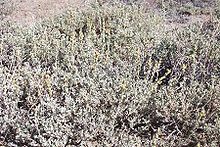Artemisia arbuscula
| Artemisia arbuscula | |
|---|---|
 |
|
| Scientific classification | |
| Kingdom: | Plantae |
| (unranked): | Angiosperms |
| (unranked): | Eudicots |
| (unranked): | Asterids |
| Order: | Asterales |
| Family: | Asteraceae |
| Genus: | Artemisia |
| Species: | A. arbuscula |
| Binomial name | |
|
Artemisia arbuscula Nutt. |
|
| Synonyms | |
|
|
Artemisia arbuscula is a North American species of sagebrush known by the common names little sagebrush, low sagebrush, or black sagebrush. It is native to the western United States from Washington, Oregon, and California east as far as Colorado and Wyoming. It grows in open, exposed habitat on dry, sterile soils high in rock and clay content.
Artemisia arbuscula is a gray-green to gray shrub forming mounds generally no higher than 30 centimetres (12 in). Its many branches are covered in hairy leaves each less than a centimeter long. The inflorescence is a spike-shaped array of clusters of hairy flower heads. Each head contains a few pale yellow disc florets but no ray florets. The fruit is a tiny achene less than a millimeter wide.
...
Wikipedia
